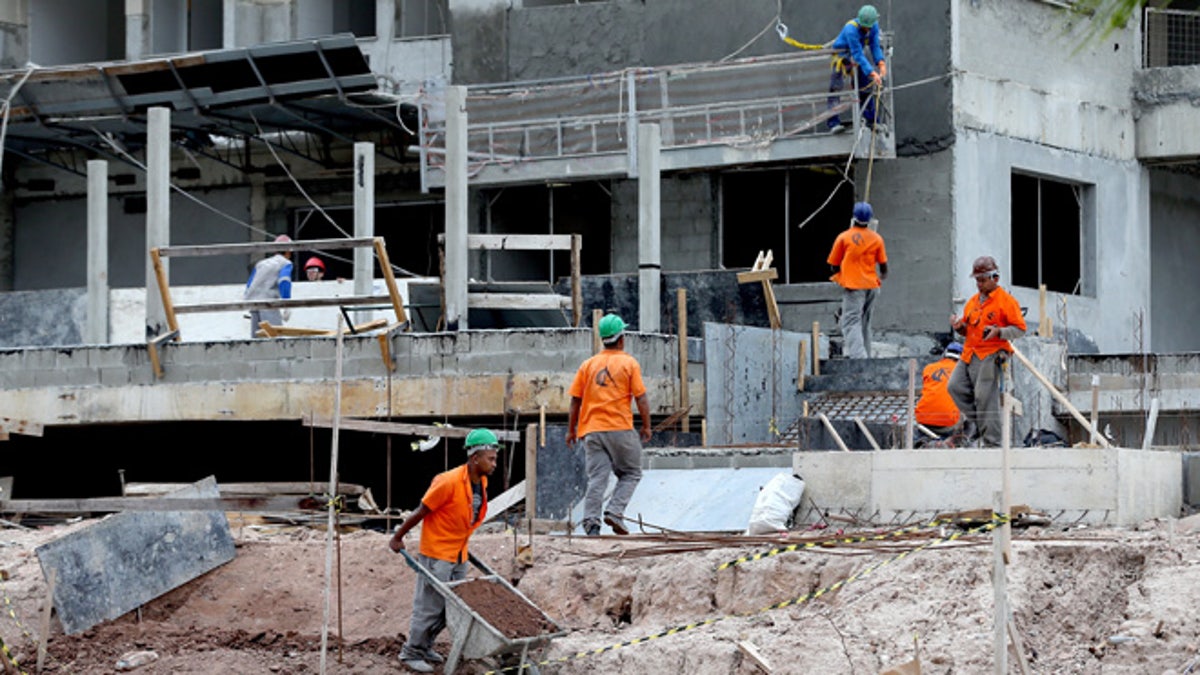
RIO DE JANEIRO, BRAZIL - JULY 21: Construction progress takes place during a tour of the Ilha Pura housing complex, the future site of the Athletes' Village for the Rio 2016 Olympic Games, on July 21, 2015 in Rio de Janeiro, Brazil. (Photo by Matthew Stockman/Getty Images) (2015 Getty Images)
Two years ago, on the eve of the 2014 World Cup in Brazil, a number of venues like São Paulo's Itaquerão stadium and other facilities weren't completed – causing much consternation among athletes and members of the media who lamented the temporary grandstands, slapped-together media centers and other makeshift workarounds.
The record was even worse on rail links that had been promised. Monorails, high-speed rails, airport links all had to be scrapped or delayed as the Cup approached. According to the International Railway Journal, of the 45 projects inaugurated, 15 were opened in a not fully completed form before the Cup, 10 opened during the tournament and 32 were expected to be completed after its conclusion. All of which was a massive black eye for the country on the international scene.
You would think that Rio de Janeiro's Olympic organizers might have taken a few notes.
So why – with only two days to go before the opening ceremony in in Rio’s Maracanã stadium – are they struggling to finish a slew of venues, athletes' housing and metro lines slated to be ready for the start of the Olympics?
That is the question on many people’s minds, including delegations from Argentina, Australia, Spain and Sweden who arrived at their athletes' quarters only to find blocked toilets, leaking pipes, exposed wiring, dirty floors and darkened stairwells where no lighting has been installed.
“Although the Rio organizers say they are going to finish the repairs, we can’t risk it,” Gerardo Werthein, the head of the Argentine Olympic Committee, said in a statement. “One of the most-affected buildings is ours, as well as Australia’s.”
Brazilian authorities have promised that the work will be finished as quickly as possible and that 600 additional laborers have been added to help with the effort, but the task is hampered by their desire to not disturb the athletes who are in the Olympic Village or to compromise the security of the facilities.
Adding to the Olympic organizers' woes are continuing controversy over raw sewage that pollutes the sites of rowing, sailing, canoeing, open water swimming and triathlon events – not to mention budget cuts, slow ticket sales, and concerns over crime and the Zika virus. And the games come to town with Brazil's elected president awaiting an impeachment proceeding and its economy gripped by a severe recession.
The polluted water has caused the most coverage thanks in large part to a 16-month-long study commissioned by the Associated Press that found consistently dangerously high levels of viruses in the water.
In light of the findings, biomedical expert Valerie Harwood had one piece of advice for athletes and tourists to Rio: "Don't put your head under water."
The most contaminated points are the Rodrigo de Freitas Lagoon, where Olympic rowing will take place, and the Gloria Marina, the starting point for the sailing races.
The bad press coming from Rio in the lead-up to the games has been criticized by some experts and athletes alike who say that the problems are being overblown.
In a heartfelt piece on her blog, U.S. Olympic rower Megan Kalmoe told naysayers to stop badmouthing Rio.
“I have worked for ten years to get to this point and will continue to work as hard as I can over the next few weeks to make the most of this very special and unique opportunity,” Kalmoe wrote. "But all you want to do is talk about s--- in the water. My request to everyone who is fixated on s--- in the water: stop. Stop trying to ruin the Olympics for us."
U.S. women’s soccer goalie Hope Solo, who only a matter of months ago was considering not coming to Brazil for fear of contracting Zika, echoed Kalmoe’s statements and blamed the American media for spreading fear ahead of the Games.
"We haven't made it to Rio yet, and I have no idea what to expect in Rio, but it's been beautiful here," Solo said ahead of Wednesday's opener against New Zealand in Belo Horizonte.
"It's a little bit unfortunate, because I think the American media has been really tough on people of Brazil," she said. "I feel a little bit bad because when you come here you learn for yourself. I think that we've been very hard on the local people."
Detractors, experts say, should look at Brazil successfully holding international sporting events in the recent past – from international surf competitions to yearly Formula One races to playing host to the World Cup – as an indication that they are capable of adequately hosting the Olympic Games.
“Rio will definitely be able to pull of this event,” Jason Marczak, director of the Economic Growth Initiative at the Atlantic Council's Adrienne Arsht Latin America Center, told Fox News Latino. “They have done it in the past, and they will be able to do it again.”
He added, “A successful Olympics will help Brazil show they are still a major player and a major economy and that the darkest days are behind for the country.”
Instead of worrying about Rio being ready for the Olympics, Marczak suggested that the most telling part of the experience won't happen until the Games are over.
“How can the host city use the money spent and earned for the Olympics to actually help the people of Brazil?” he asked. “That’s the real question.”
The Associated Press contributed to this report.
